美国历史常识
美国历史大事年表

美国历史大事年表1863.1.1 林肯签署《解放宣言》。
1879.12.21 托马斯·爱迪生发明电灯。
1903.12.17 莱特兄弟首次成功地驾驶由发动机推进的飞机。
1941.12.7 日本偷袭珍珠港。
次日,美国对日宣战,正式参加第二次世界大战。
1944.6.6 美国军队及盟军在诺曼底登陆。
1945.7.16 成功地进行了世界上第一次核爆炸。
1949.8.24 美国、加拿大和14个西欧国家在华盛顿签署一项公约,建立北大西洋公约组织。
1952.11.1 美国在太平洋实验场爆炸一颗氢弹。
1954.12.1 美国一黑人妇女在蒙哥马利城的公共汽车上拒绝把自己的座位让给一个白人男子。
联邦法院非法宣布公共汽车种族隔离命令。
1959.1.3 阿拉斯加成为美国第49州。
同年8月21日,夏威夷成为第50州。
1961.4.17 美国策动猪仔湾事件,企图推翻古巴政府。
1963.11.22 肯尼迪总统在得克萨斯州达拉斯市遇刺身亡。
1968.4.4 美国黑人民权领袖马丁·路德·金在田纳西州孟菲斯遭暗杀身亡。
1969.7.20 “阿波罗”11号飞船登月成功,人类首次踏上月球。
1972.2.21 美国总统尼克松抵达北京,对中国进行为期8天的访问,与中国领导人举行会谈。
访问结束时,中美签署上海公报。
1974.8.9 尼克松因“水门事件”,辞去总统职务,由副总统吉拉尔德·福特继任总统。
1975.12.15 福特总统访问中国,并与毛泽东主席及邓小平副总理会谈。
1979.1.1 美国与中华人民共和国建立全面外交关系。
1982.12.2 在盐湖城,美国医生成功地为一患者进行人工心脏移植手术。
1984.4.26 美国总统里根访问中国,与中国领导人举行会谈。
1989.12.20 美国军队入侵巴拿马。
1991.1-2 在中东海湾战争中,美国及其盟国打败伊拉克,解放科威特。
1863.1.1 林肯签署《解放宣言》。
美国历史简介
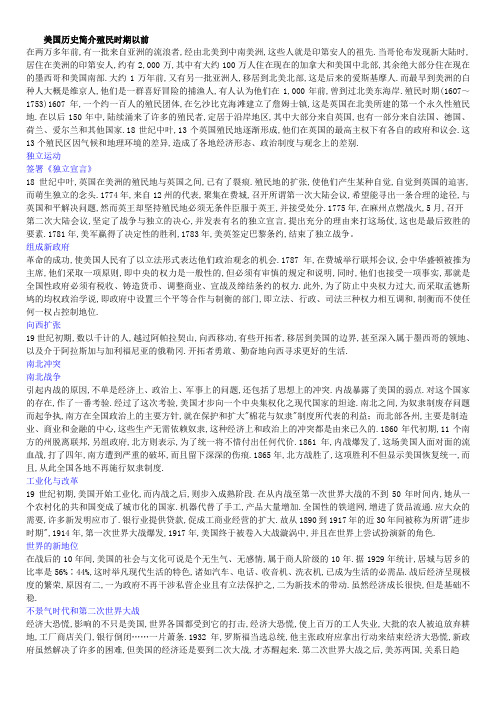
美国历史简介殖民时期以前在两万多年前,有一批来自亚洲的流浪者,经由北美到中南美洲,这些人就是印第安人的祖先.当哥伦布发现新大陆时,居住在美洲的印第安人,约有2,000万,其中有大约100万人住在现在的加拿大和美国中北部,其余绝大部分住在现在的墨西哥和美国南部.大约1万年前,又有另一批亚洲人,移居到北美北部,这是后来的爱斯基摩人.而最早到美洲的白种人大概是维京人,他们是一群喜好冒险的捕渔人,有人认为他们在1,000年前,曾到过北美东海岸.殖民时期(1607~1753)1607年,一个约一百人的殖民团体,在乞沙比克海滩建立了詹姆士镇,这是英国在北美所建的第一个永久性殖民地.在以后150年中,陆续涌来了许多的殖民者,定居于沿岸地区,其中大部分来自英国,也有一部分来自法国、德国、荷兰、爱尔兰和其他国家.18世纪中叶,13个英国殖民地逐渐形成,他们在英国的最高主权下有各自的政府和议会.这13个殖民区因气候和地理环境的差异,造成了各地经济形态、政治制度与观念上的差别.独立运动签署《独立宣言》18世纪中叶,英国在美洲的殖民地与英国之间,已有了裂痕.殖民地的扩张,使他们产生某种自觉,自觉到英国的迫害,而萌生独立的念头.1774年,来自12州的代表,聚集在费城,召开所谓第一次大陆会议,希望能寻出一条合理的途径,与英国和平解决问题,然而英王却坚持殖民地必须无条件臣服于英王,并接受处分.1775年,在麻州点燃战火,5月,召开第二次大陆会议,坚定了战争与独立的决心,并发表有名的独立宣言,提出充分的理由来打这场仗,这也是最后致胜的要素.1781年,美军赢得了决定性的胜利,1783年,美英签定巴黎条约,结束了独立战争。
组成新政府革命的成功,使美国人民有了以立法形式表达他们政治观念的机会.1787年,在费城举行联邦会议,会中华盛顿被推为主席,他们采取一项原则,即中央的权力是一般性的,但必须有审慎的规定和说明,同时,他们也接受一项事实,那就是全国性政府必须有税收、铸造货币、调整商业、宣战及缔结条约的权力.此外,为了防止中央权力过大,而采取孟德斯鸠的均权政治学说,即政府中设置三个平等合作与制衡的部门,即立法、行政、司法三种权力相互调和,制衡而不使任何一权占控制地位.向西扩张19世纪初期,数以千计的人,越过阿帕拉契山,向西移动,有些开拓者,移居到美国的边界,甚至深入属于墨西哥的领地、以及介于阿拉斯加与加利福尼亚的俄勒冈.开拓者勇敢、勤奋地向西寻求更好的生活.南北冲突南北战争引起内战的原因,不单是经济上、政治上、军事上的问题,还包括了思想上的冲突.内战暴露了美国的弱点.对这个国家的存在,作了一番考验.经过了这次考验,美国才步向一个中央集权化之现代国家的坦途.南北之间,为奴隶制废存问题而起争执,南方在全国政治上的主要方针,就在保护和扩大"棉花与奴隶"制度所代表的利益;而北部各州,主要是制造业、商业和金融的中心,这些生产无需依赖奴隶,这种经济上和政治上的冲突都是由来已久的.1860年代初期,11个南方的州脱离联邦,另组政府,北方则表示,为了统一将不惜付出任何代价.1861年,内战爆发了,这场美国人面对面的流血战,打了四年,南方遭到严重的破坏,而且留下深深的伤痕.1865年,北方战胜了,这项胜利不但显示美国恢复统一,而且,从此全国各地不再施行奴隶制度.工业化与改革19世纪初期,美国开始工业化,而内战之后,则步入成熟阶段.在从内战至第一次世界大战的不到50年时间内,她从一个农村化的共和国变成了城市化的国家.机器代替了手工,产品大量增加.全国性的铁道网,增进了货品流通.应大众的需要,许多新发明应市了.银行业提供贷款,促成工商业经营的扩大.故从1890到1917年的近30年间被称为所谓"进步时期",1914年,第一次世界大战爆发,1917年,美国终于被卷入大战漩涡中,并且在世界上尝试扮演新的角色.世界的新地位在战后的10年间,美国的社会与文化可说是个无生气、无感情,属于商人阶级的10年.据1929年统计,居城与居乡的比率是56%∶44%,这时举凡现代生活的特色,诸如汽车、电话、收音机、洗衣机,已成为生活的必需品.战后经济呈现极度的繁荣,原因有二,一为政府不再干涉私营企业且有立法保护之,二为新技术的带动.虽然经济成长很快,但是基础不稳.不景气时代和第二次世界大战经济大恐慌,影响的不只是美国,世界各国都受到它的打击,经济大恐慌,使上百万的工人失业,大批的农人被迫放弃耕地,工厂商店关门,银行倒闭……一片萧条.1932年,罗斯福当选总统,他主张政府应拿出行动来结束经济大恐慌,新政府虽然解决了许多的困难,但美国的经济还是要到二次大战,才苏醒起来.第二次世界大战之后,美苏两国,关系日趋恶化,分别在军事、政治、经济、宣传各方面,加紧准备,一如战时,这种状态,被称为"冷战".美国大事年表1607.5英国伦敦公司在弗吉尼亚的詹姆斯敦建立第一个永久居留地。
美国
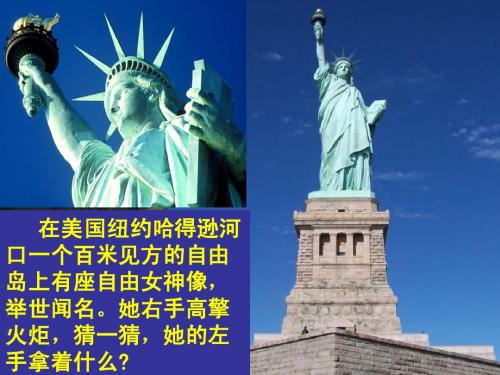
材料1 马克思说:美国是“ 材料1:马克思说:美国是“宣布了第一个人权 宣言和最先推动了18世纪的欧洲革命的地方”;是 宣言和最先推动了18世纪的欧洲革命的地方” 18世纪的欧洲革命的地方 最先产生了伟大的民主共和国思想的地方” “最先产生了伟大的民主共和国思想的地方”。 材料2 美国独立战争和《独立宣言》 材料2:美国独立战争和《独立宣言》在大洋彼 岸的中国引起了很大的反响。自那时起, 岸的中国引起了很大的反响。自那时起,华盛顿及其 领导的美国革命一直是近代中国进步人士心目中的理 想和榜样。1897年章太炎在 变法箴言》 年章太炎在《 想和榜样。1897年章太炎在《变法箴言》中称华盛顿 功若女娲、燧人” 独立宣言》 “功若女娲、燧人”。《独立宣言》在中国被首次翻 译并发表在1901年出版的《国民报》第一期上。 1901年出版的 译并发表在1901年出版的《国民报》第一期上。1903 年陈天华在《猛回头》中疾呼: 要学那,美利坚, 年陈天华在《猛回头》中疾呼:“要学那,美利坚, 离英自立” 离英自立”。 探究5 结合材料和所学内容:归纳: 探究5:结合材料和所学内容:归纳: 独立宣言》有何进步性 进步性? 《独立宣言》有何进步性?
背景1 背景1:欧洲启蒙思想在北美社会传播为 情景一 独立宣言》的问世奠定了理论基础。 《独立宣言》的问世奠定了理论基础。
1607— 1607—1733
北美殖民地
在英属北美殖民地,经过100多年 在英属北美殖民地,经过100多年 100 的发展, 的发展,来自英国和欧洲其它国家的 移民…… ……, 移民……,从欧洲带来的启蒙思想在 北美的不断传播使北美民族民主意识 增强, 增强,许多人对启蒙思想家的著作耳 熟能详,把新思想奉为“ 熟能详,把新思想奉为“不言而喻的 真理”……在共同的语言 在共同的语言, 真理”……在共同的语言,共同的地 域促使下美利坚民族的逐渐形成 美利坚民族的逐渐形成。 域促使下美利坚民族的逐渐形成。 ——《全球通史》 ——《全球通史》
美国历史与文化

第一讲从殖民地到“超级大国”:美国的发展历程美国的奠基时代(1607-1775年)1.北美13个殖民地1607到1733年,英国在北美陆续建立了13个殖民地殖民地的社会结构:上层是以总督为首的大商人、大土地所有者或种植园奴隶主;中间是小土地所有者、小工厂主、技师和自耕农等;底层是白人契约奴和黑人奴隶美利坚民族的形成殖民地间经济的差异性促进了彼此商品的流通,逐渐形成了统一的市场。
经济的交往也促进了文化的交流,如哈佛学院。
最早具有民族意识的知识分子,如托马斯•杰斐逊、詹姆斯•麦迪逊、亚历山大•汉密尔顿等;英语逐渐成为他们的共同语言;共同的心理素质。
3.英国与北美殖民地矛盾的激化¨1773年茶叶税法,波士顿倾茶事件¨ 1774年3月始,英国政府接连颁布了5项高压法令(“不可容忍的法令Intolerable Acts”)。
二、美国的建立与初步繁荣(1776-1860年)1.美国独立革命(1775-1783年)The War of American Independence “列克星敦枪声Lexington”和独立战争的爆发(1775年4月19日) Someone fi red the “shot heard round the world”1775年5月10日召开的第二届大陆会议开始招募军队,华盛顿被任命为统一的美利坚军队的总司令托马斯•潘恩于 1776年1月10日发表《常识》Common Sense《独立宣言》与美国的建立1776年7月4日《独立宣言》Declaration of Independence July 4, 1776天赋人权和社会契约论social contract,认为人人生而平等,享有不可剥夺的“生命权、自由权和追求幸福的权利”“We hold these truths to be self-evident, that all men are created equal, that they are endowed by their Creator with certain unalienable rights, that among these are life, liberty, and the pursuit of happiness.” 美国革命通过《独立宣言》以及由此导致的一系列立法,创造了一个全新的国家从邦联到联邦邦联制下的美国《邦联条例》 Article of Confederation (1777)谢斯起义 Rebel of Shays《1787年宪法》Constitution of the Unites States与联邦体制 Federal System的确立1787年5月25日至9月15日在费城召开制宪会议。
美国历史简介
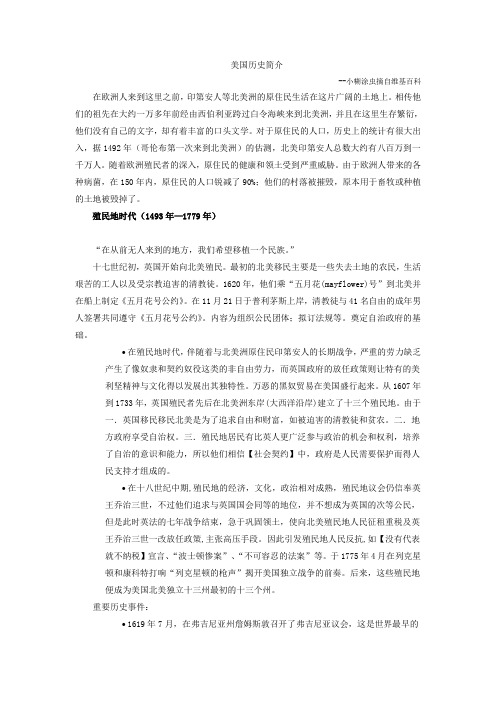
美国历史简介--小糊涂虫摘自维基百科在欧洲人来到这里之前,印第安人等北美洲的原住民生活在这片广阔的土地上。
相传他们的祖先在大约一万多年前经由西伯利亚跨过白令海峡来到北美洲,并且在这里生存繁衍,他们没有自己的文字,却有着丰富的口头文学。
对于原住民的人口,历史上的统计有很大出入,据1492年(哥伦布第一次来到北美洲)的估测,北美印第安人总数大约有八百万到一千万人。
随着欧洲殖民者的深入,原住民的健康和领土受到严重威胁。
由于欧洲人带来的各种病菌,在150年内,原住民的人口锐减了90%;他们的村落被摧毁,原本用于畜牧或种植的土地被毁掉了。
殖民地时代(1493年—1779年)“在从前无人来到的地方,我们希望移植一个民族。
”十七世纪初,英国开始向北美殖民。
最初的北美移民主要是一些失去土地的农民,生活艰苦的工人以及受宗教迫害的清教徒。
1620年,他们乘“五月花(mayflower)号”到北美并在船上制定《五月花号公约》。
在11月21日于普利茅斯上岸,清教徒与41名自由的成年男人签署共同遵守《五月花号公约》。
内容为组织公民团体;拟订法规等。
奠定自治政府的基础。
·在殖民地时代,伴随着与北美洲原住民印第安人的长期战争,严重的劳力缺乏产生了像奴隶和契约奴役这类的非自由劳力,而英国政府的放任政策则让特有的美利坚精神与文化得以发展出其独特性。
万恶的黑奴贸易在美国盛行起来。
从1607年到1733年,英国殖民者先后在北美洲东岸(大西洋沿岸)建立了十三个殖民地。
由于一.英国移民移民北美是为了追求自由和财富,如被迫害的清教徒和贫农。
二.地方政府享受自治权。
三.殖民地居民有比英人更广泛参与政治的机会和权利,培养了自治的意识和能力,所以他们相信【社会契约】中,政府是人民需要保护而得人民支持才组成的。
·在十八世纪中期,殖民地的经济,文化,政治相对成熟,殖民地议会仍信奉英王乔治三世,不过他们追求与英国国会同等的地位,并不想成为英国的次等公民,但是此时英法的七年战争结束,急于巩固领土,使向北美殖民地人民征租重税及英王乔治三世一改放任政策,主张高压手段。
高三历史美国独立宣言知识点(Word版)
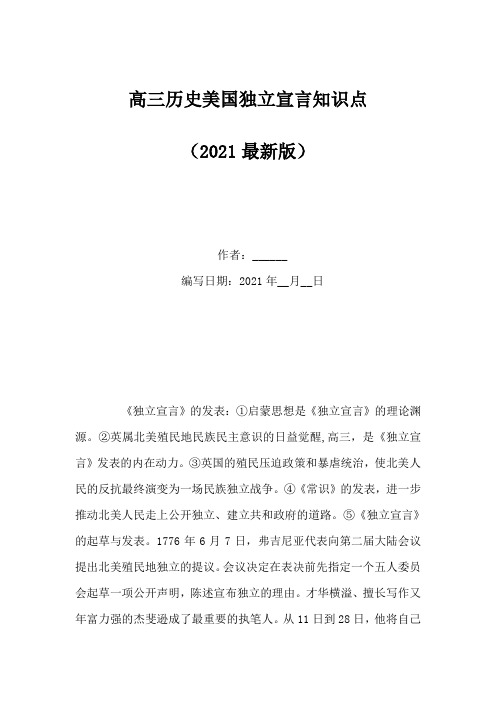
高三历史美国独立宣言知识点(2021最新版)作者:______编写日期:2021年__月__日《独立宣言》的发表:①启蒙思想是《独立宣言》的理论渊源。
②英属北美殖民地民族民主意识的日益觉醒,高三,是《独立宣言》发表的内在动力。
③英国的殖民压迫政策和暴虐统治,使北美人民的反抗最终演变为一场民族独立战争。
④《常识》的发表,进一步推动北美人民走上公开独立、建立共和政府的道路。
⑤《独立宣言》的起草与发表。
1776年6月7日,弗吉尼亚代表向第二届大陆会议提出北美殖民地独立的提议。
会议决定在表决前先指定一个五人委员会起草一项公开声明,陈述宣布独立的理由。
才华横溢、擅长写作又年富力强的杰斐逊成了最重要的执笔人。
从11日到28日,他将自己关在下榻处,忘我地投入到宣言初稿的激情创作之中。
7月2日,大陆会议做出支持独立的选择。
7月4日,讨论修改后的《独立宣言》获得一致通过,这一天也因此成为美国的独立纪念日。
《独立宣言》发表历史背景:(1)欧洲启蒙思想在北美社会产生了深刻影响,为《独立宣言》的问世奠定了理论基础传播。
(2)北美产生了自己的启蒙思想富兰克林和杰斐逊,民族民主意识觉醒。
(3)潘恩发表的《常识》产生了巨大影响,激励更多的人为独立而战。
(4)独立战争爆发后,争取独立成为整个殖民地人民的共同目标。
(5)大陆会议决定宣布独立,1776年7月4日,杰斐逊为首五人委员会草拟的《独立宣言》通过。
《独立宣言》的发表:在人民革命斗争的推动下,北美13个殖民地代表组成的大陆会议决定宣布独立。
1776年7月4日,大陆会议经过激烈争论后,通过了由杰斐逊等人起草的《独立宣言》。
美国独立宣言是由其它13个殖民地代表签署的最初声明美国从英国独立的文件。
独立宣言中写道:“我们以这些殖民地的善良人民的名义和权力,谨庄严地宣布并昭告:这些联合殖民地从此成为、而且名正言顺地应当成为自由独立的合众国;它们解除对于英王的一切隶属关系,而它们与大不列颠王国之间的一切政治联系亦应从此完全废止。
美国历史常识
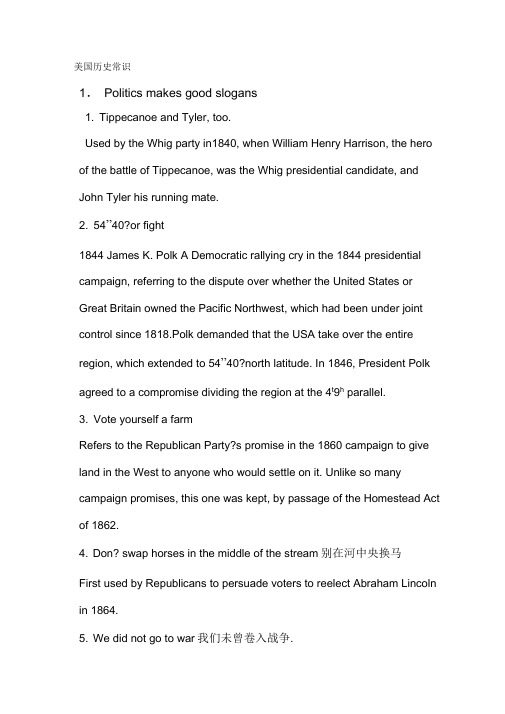
美国历史常识1.Politics makes good slogans1. Tippecanoe and Tyler, too.Used by the Whig party in1840, when William Henry Harrison, the hero of the battle of Tippecanoe, was the Whig presidential candidate, and John Tyler his running mate.2. 54”40?or fight1844 James K. Polk A Democratic rallying cry in the 1844 presidential campaign, referring to the dispute over whether the United States or Great Britain owned the Pacific Northwest, which had been under joint control since 1818.Polk demanded that the USA take over the entire region, which extended to 54”40?north latitude. In 1846, President Polk agreed to a compromise dividing the region at the 4t9h parallel.3. Vote yourself a farmRefers to the Republican Party?s promise in the 1860 campaign to give land in the West to anyone who would settle on it. Unlike so many campaign promises, this one was kept, by passage of the Homestead Act of 1862.4. Don? swap horses in the middle of the stream别在河中央换马First used by Republicans to persuade voters to reelect Abraham Lincoln in 1864.5. We did not go to war我们未曾卷入战争.A phrase used by Martin Henry Glynn, a former governor of New York, in the keynote speech at the 1916 Democratic Convention, which nominated Woodrow Wilson for a second term. When it and other references to Wilson?s success in maintaining neutrality drew thunderous applause, the Democrats decides to stress that argument in the fall campaign.6. Every man a king人人皆国王The slogan of the Louisiana senator Huey Long?s Share Our Wealth movement during the Great Depression. Long proposed to confiscate all fortunes of more than five million dollars and all incomes of more than one million dollars, and to use the money to give every American family a house, a car, and an annual income of two thousand dollars or more.7. A chicken for every pot锅锅有鸡.户户有车And a car for every garage. Used by the Republicans in the 1928 presidential campaign to suggest what they liked to call “Coolidge prosperity.”& Had enough?受够了?The question was asked by the Republicans during 1946 congressional elections. After fourteen years of “Democratic rule”the Republicans maintained, it was “time for a change”.9. A choice, not an echc选择而非附和The postwar rallying cry of conservative Republicans opposed tonominating Republicans who favored accepting most New Deal reforms. When, in 1964, the conservatives succeeded in nominating Barry Goldwater for President, they made wide use of the slogan “In your heart you know he?s right,”prompting democrats to retort...10. In your guts, you kn ow hes nuts你们心里明白他是个疯子11. a pubic office is a public trust.公职乃公众的信托This 1884 Democratic campaign slogan reminded voters that the Republican candidate was believed to have sold favors to a railroad while Speaker of the House in the 1870s.12. we do our part我们做份内之事The motto of NRA, the New Dea?ls National Administration, was used in conjunction with the famous Blue Eagle emblem to identify the products of companies that had adopted NRA codes of fair business practices.13. Nixon@ the one尼克松正是人选Republican slogan in the 1968 presidential campaign, sometimes used by the Democrats on posters bearing the photograph of a very pregnant black woman.2. They shot the president1 . John Wilkes Booth shot and killed Lincoln in a Washington theater inApril 1865. Booth was a rabid Confederate sympathizer whobelieved slavery was “one of the greatest bless in gs・God everbestowed upon a favored n ation.2.Leon F. Czolgosz, an anarchist, shot and killed William McKinley in 1901, while he was shaking hands on a reception line at the Pan-American Exposition in Buffalo, because he was against allgovernment and because“I didn?t believe one man should have somuch services and another man should have non”e.3.John F. Shrank shot at the former president Theodore Roosevelt as he was leaving a hotel in Milwaukee on his way to make a speechduring his Bull Moose campaign in 1912.4.Lee Harvey Oswald shot and killed John F. Kennedy in 1963, but his motive can?t be determined, nor for that matter can his responsibility for the murder be settled beyond question, since he himself waskilled by one Jack Ruby before he could be brought to trial. 5.John W. Hinckley, JR., shot and seriously wounded Ronald Reagon and three members of his party in March 1981 outside a Washington hotel because Hinckley wished to impress Jodie Foster, an actressfor whom he had developed a secret passion after seeing her in amovie. The day of the shooting he wrote, but did not mail, a letter toher saying, “The reason I?m going ahead with this attempt now isbecause I just cannot wait any longer to impress you.” Hinckley,who was acquitted on the grounds of insanity, is also alleged to havetold someone in Texas that “as far as he was concerned, politicians should be eliminated”.3.Seven supreme court decisions1. Marbury & Madison1803 William Marbury sued Secretary of StateJames Madison in order to obtain a commission appointing him ajustice of the peace that had been signed but not delivered by retiring President John Adams. Important because in deciding the case, the Court for the first time declared a law of Congress unconstitutional.2. McCullough & Maryland1819, John W. McCullough, cashier of theBaltimore branch of the bank of the United States, was sued byMaryland because he refused to pay a tax levied on the bank by the date legislature. The case is notable because, in deciding it in favor of the bank, Chief Justice John Marshall interpreted the powers ofCongress broadly. The Constitution did not specifically grant Congress the right to create a bank, but a bank was a reasonable way forCongress to exercise powers enumerated in the documen“tl.et the end be legitimate,” Marshall declared, “and all means which areappropriate …are con stituti on al. ” Since the bank was con stituti onal and since the Constitution was the supreme law, the state tax on the bank was unconstitutional because “the power to tax involves thepower to destroy”.3. Gibbons&Ogden1824 Thomas Gibbons and Aaron Ogden were rivalferryboat operators. Ogden had been granted the exclusive right tooperate a ferry between New York City and New Jersey by New York State, but Gibbons set up a competing line. When Ogden sued, theSupreme Court decided that the New York law was unconstitutional because it interfered with interstate commerce, a prerogative of thefederal government. By defining commerce as“intercourse”and notmerely as the movement of goods, the Court laid the basis for the later federal regulation, radio, and television, and other forms oftransportation and communication.4. Plessy&Fergusion1896 Homer Adolph Plessy, a light-skinned Louisianablack man, was arrested for sitting in a railway car reserved byLouisiana law for whites. In a New Orleans court his lawyers argued that the law was unconstitutional, but Judge John H. Ferguson ruled against them, on the ground that the railway had provided separate but equally good cars for blacks, as the law required. This line of reasoning was upheld by the Supreme Court. The case is remembered todaymainly for the dissent of Justice John Marshall Harlan. Ou rConstitution is color -blind,” Harlan wrote.The arbitrary separation of citizens, on the basis of race•…is a badge of servitude wholly inconsistent with civil freedom”.5. Brown&Board of education of Topeka1954 This is the famous school-desegregation case in which the Court unanimously overturnedPlessy&Ferguson. “In the field of public education,”Chief Justice Earl Warren stated, “the doctrine of ,separate butequal?has no place.”6. Roe&Wade 1973 Norma McCorvey (or Jane Roe) a woman preventedfrom having an abortion by a Texas law, sued to have the lawoverturned. Henry Wade, a Dallas district attorney, pushed the case up to the SupremeCourt. Texas claimed that the case should havebeen dismissed as moot, since the plaintiff had already had her baby.In a controversial decision the Court ruled in McCorvey?s favor,establishing the right of women to have abortions during the earlymonths of pregnancy.4.The worst supreme court decisionDred Scott&Sandford1857 A slave, Dred Scott sued for his freedom on the ground that his master, an Army surgeon, had taken him to Illinois and then the Wisconsin Territory, where slavery had been barred by Congress in the Missouri Compromise. The court, whose majority decision was read by Chief Justice Roger B. Taney, ruled that the Missouri Compromise was unconstitutional because it violated the property rights protected by the Fifth Amendment, since it denied slave owners the right to take their property wherever they wanted to. In effect, this decision opened all the west to slavery, infuriated to the North, and pushed the nation more precipitously toward civil war.5.I don 'k t now him from Adams1. Samuel Adams (1722-1803), organizer of the Sons of Liberty and theBoston Tea Party, signer of the Declaration of Independence, governor of Massachusetts.2. John Adams (1735-1826), cousin of Samuel, one of the drafters of theDeclaration of Independence, a negotiator of the peace treaty ending the Revolution, first Vice-president and second President of the United States. He was called His Rotundity because of his shape.3. Abigail Smith Adams (1744-1818), wife of John, manager of the familyproperties during long periods when he was away on public business.Popular with modern feminists, especially for having urged John to“remember the ladies” while helping to create the new nation.4. John Quincy Adams (1767-1848), son of John and Abigail, diplomat,senator, President of the U.S. and, late in life, member of the House of Representatives.5. Charles Francis Adams (1807-1886), son of John Quincy, vice-presidential candidate of the Free Soil party in 1848, congressman, minister to Great Britain during the Civil War, editor of the papers of John and of John Quincy.6. Charles Francis Adams, JR. (1835-1915), son of Charles, Union officer,historian, railroad executive, public official.7. Henry Adams (1838-1918), second son of Charles Francis Sr. ,historian, editor, teacher, novelist, author of The education of HenryAdams.8. Brooks Adams (1848-1927), another son of Charles Sr. , historian,philosopher, professional pessimist.6.Good phrases for big issues1. the great war for the empire帝国之伟战The name given for what ismore commonly known as the Seven years?war by the historianLawrence Henry Gipson in his monumental The British Empire before the Revolution(1936-1967). Gipson?s point was that what American know as the French and Indian War was part of a worldwide struggle between France and Great Britain for control of vast areas in America and Asia.2. the American System美国制度a scheme designed by Henry Clay inthe 1820s. Clay sought to form a coalition of Eastern and Westerninterests in Congress. In return for Western support of protective tariffs that would benefit Eastern manufacturers, the Easterners would vote for bills providing federal expenditures on roads and canals.3. the peculiar institution. 独特体制A southern euphemism for slavery.The term was not intended to be a pejorative; by “peculiar”Southerners meant particular or unique, not odd or queer.4. waving the bloody shirt 挥动血衫.This post-Civil War Republican tacticinvolved reminding Northern voters that the south was made up mostly of Democrats and that many Northern members of that party had been at best lukewarm about resisting secession. The term came into use after the congressman Benjamin F. Butler displayed before hiscolleagues the bloodstained shirt of a Northerner who had been flogged in Mississippi. The “bloody shirt ” was used by Republicans fordecades as a way of diverting attention from political embarrassingcontemporary issues. A classic speech in this vein was given by RobertG. Ingersoll in the campaign of 1880: “Every man that lowered our flagwas a Democrat. Every man that bred bloodhounds was a Democrat.Every preacher that said slavery was a divine institution was aDemocrat. Recollect it! Every man that shot a Union soldier was aDemocrat. Every wound borne by you Union soldiers is a souvenir of a Democrat.5. manifest destiny昭然命运this term, coined by John L. COSullivan in1845 in an article in his United States Magazine and DemocraticReview, reflected the expansionist spirit of the era. It was, O?Sullivan wrote, “our manifest (obvious) destiny to overspread the continent.6. the robber barons强盗资本家this name was applied to the ultra richXI.industrialists of the late 19 th century, such as the railroad magnates Cornelius Vanderbilt and Jay Gould, and the oil tycoon John D.Rockefeller. It originated in the late 1860s but became a symbol forcorporate power and the evils of unrestrained economic freedom only with the publication of Matthew Josephson?s best seller The Robber Barons in 1934.7.Twenty wonderful nicknames1. old Hickory 老山核桃木Andrew Jackson, because of his toughness.The name dates from his days as an Indian fighter during the War of 1812. after the battle of Horseshoe Bend in Alabama in 1814, his Creek Indian foes gave him another name “, Sharp knife”.2. His accidence. (碰巧阁下)John Tyler, so called after he succeededto the Presidency upon the death of William Henry Harrison in 1841.Since this was the first time a President had died in his office, there was some question as to the extent of Tylesr?authority.3. old rough and ready. (胸有成竹的大老粗)Zachary Taylor was giventhis time by his troops during his long career in the army, because of his informal yet confidence-building way of dealing with them and hisrough-hewn appearance.4. the rough rider 粗犷骑兵Theodore Roosevelt(also called TR andTeddy, which later name he disliked intensely), because of theregiment of that name, composed of a motley mixture of cowboys,adventurers, and odd characters raised by Roosevelt to fight in theSpanish-American War.5. Big Bill. 大块头比尔William Howard Taft, because he weighed morethan three hundred pounds.6. Silent Cal. 沉默的加尔Calvin Coolidge, who had little to say iteconomically, e.g. “The American business is business”. and, when asked if he would seek reelection in1928“, I do not choose to run”.7. The happy warrior. 快乐斗士Alfred E. Smith, who was given the nameby Franklin D. Roosevelt in the course of a speech nominating him for President at the 1924 Democratic Convention.8. The Kingfish.头儿Huey P. Long, because of his total dominance of hisnative state of Louisiana.9. Tail Gunner Joe. 机尾射手乔Joseph R. McCarthy, theCommunist-hunting senator who claimed ---falsely--- to have been a tail gunner on American bombers during World War II.10. T ricky Dick. 狡猾的迪克Richard M. Nixon, because of his shifty,calculating political style. The phrase long antedated the Watergatescandal.11. L andslide Lyndon. 压倒多数的林登Lyndon B. Johnson, because ofthe paper-thin margin by which he won Texas?s Democratic primary for the Senate in 1948.8.Seven speeches to remember1.George Washington?s Farewell address(1796), in to which hestressed the importance of national unity as the “main pillar ”of thenation?s independence, peace, and prosperity.2.Thomas Jefferson?s first inaugural address(1801), which contains his famous reference to the United States as ,the world ?s besthope?and his praise of ,wise and frugal government which shallrestrain men from injuring one another, and shall leave themotherwise free to regulate their own pursuits”. At the time, the factthat Jefferson?s election marked the first real change of party control of the government made his promise to respect the rights of theFederalist minority seem the most important point in the address. 3.Daniel Webster?s second reply to Hayne(1830), in which he called the American flag “the gorgeous ensign of the republic” and concludedwith the sentence: Liberty and Union, now and forever, one andinseparable.” Webster?s grandiloquence was much admired bycontemporaries, but the speech was actually important because ofits powerful refutation of the passionate but confused argument ofSouth Carolina?s Senator Robert Y. Hayne that the separate stateswere the ultimate source of sovereignty in the American politicalsystem.4.Abraham Lincoln?s “House Divided”speech, (1858), delivered on the occasion of his nomination as the Republican candidate for senatorfrom Illinois. This was probably Lincoln ?s most radicalstatementabout the implications of the slavery issue, the one inwhich he predicted that “ this government cannot endurepermanently half slave and half free.”It got him in some trouble with Northern conservatives, especially when opponents quoted theremark out of context in order to suggest that Lincoln was anabolitionist. Lincoln did not, in this speech or on any other occasion before the war, call for the abolition of slavery.5.William Jennings Bryan?s “Cross of Gold”speech, at the 1896 Democratic National Convention, Bryan, arguing for the a plank inthe party platform calling for the free coinage of silver, ended withthe sentence “You shall not press down upon the brow of labor this crown of thorns, you shall not crucify mankind upon a cross ofgold.”“You”were the Gold Democrats, the supporters of theincumbent President, Grover Cleveland, who opposed the unlimited coinage of silver. The speech made a national figure of the thirty -six-year-old Bryan and led to his nomination for the Presidency bythe convention.6.Woodrow Wilson?s call for declaration of war againstGermany(1917), which contains the famous line“The world must be made safe for democracy.” The speech is remarkable for Wilson?sinsistence that “we have no quarrel with German people •••. Wefight without ran cor and without selfish object.”Such forbearance and Wilson?s promise that victory would result ina “universal dominion of right ”helped win liberal support for the wareffort, but it contributed to postwar disillusionment when his idealistic hopes were not realized.7.Franklin D. Roosevelt?s first inaugural address(1933), rememberedfor the line “the only thing we have to fear is fear itself,” forRoosevelt?s promise “to put people to work,”and perhaps for use of the phrase “good neighbor”when referring to foreign policy. It wasan extraordinarily effective speech, but it also contained a good deal of windy political foolishness, and a considerable amount of badadvice. For example, the President felt it necessary to point out that “happiness lies not in the mere possession of money”; he promiseto balance the federal budget and urged state and localgovernments to reduce their expenditures “drastically ”; and heclaimed that there was an “overbalance of population”in thenation?s cities.9.Ten paintings that say “America ”10. Quotations worth quoting1. I heard the bullets whistle, and , believe me, there is something charming in the sound.”----- G eorge Washington, writing to his brotherafter his first experience in battle in 1754.2. o ! ye that love mankind! Ye that dare oppose not only the tyranny but the tyrant, stand forth! ---Thomas Paine, urging the colonies to declare their11. s ome famous things they didn 's t ay12. k now these six great historians13. one date everyone gets wrong14. what 's new?15 phrases that grabbed us16. texts that changed our lives17. Rockefellers18. ten more wonderful nicknames19. land of rebels20. c artoons21. three more things that they didn 's t ay22. it 's a panic23. seven famous warships24. five black “Troublemakers ”25. women on women26. let 's make a deal27. W ho invented it?28. T he invention that wasn 't。
美国大事年表

美国大事年表一、独立战争1775年莱克星顿枪声,北美独立战争开始1776年潘恩《常识》发表1776年7月4日《独立宣言》美国独立1777年萨拉托加大捷1777年大陆会议通过《邦联条例》1781年美国打败英国殖民军队1783年英国承认美国独立,建立邦联制国家1786年美国发生“谢司起义”1787年在费城召开的制宪会议(麦迪逊)通过了一部联邦宪法,它是世界第一部成文宪法1789年华盛顿就任美国总统,第一届国会选举产生,美国联邦制共和政体开始确立。
1791年宪法的前十条修正案——“权利法案”生效1799年华盛顿去世19世纪20年代末到30年代初是美国两党制形成的重要时期1807年富尔敦发明蒸汽轮船1825年欧文建立“新和谐公社”1828年民主党正式组成1837年莫尔斯发明有线电报1844年中美《望厦条约》1853年“黑船事件”1854年《日美亲善条约》1854年共和党成立19世纪50年代中期,民主党(驴)和共和党(象)两大党的对峙格局最终形成1856-1860年美国参与第二次鸦片战争,中美《天津条约》1860年共和党开始执政1861年林肯为总统二、美国内战1861-1865年美国内战1876年美国人贝尔发明电话1879年碳丝灯泡(爱迪生)三、殖民战争1898年美西战争,美国获胜1899年美国提出门户开放政策19世纪末美国出现爵士乐,并在一战后受到空前欢迎1900-1901年美国参与八国联军1903年美国莱特兄弟发明飞机升入天空20世纪初美国人格里菲斯导演《一个国家的诞生》1914-1919美国与日本加大对中国的经济侵略四、一战1917-1918年美国参加一战1919-1922年美国参加巴黎和会与华盛顿会议1924-1929美国进入相对稳定时期,史称“柯立芝繁荣”1927年美国首次拍摄有声电影1929-1933年美国进入大危机1933年罗斯福新政1936年英国经济学家凯恩斯《就业、利息和货币通论》出版。
- 1、下载文档前请自行甄别文档内容的完整性,平台不提供额外的编辑、内容补充、找答案等附加服务。
- 2、"仅部分预览"的文档,不可在线预览部分如存在完整性等问题,可反馈申请退款(可完整预览的文档不适用该条件!)。
- 3、如文档侵犯您的权益,请联系客服反馈,我们会尽快为您处理(人工客服工作时间:9:00-18:30)。
美国历史常识1.Politics makes good slogans1. Tippecanoe and Tyler, too.Used by the Whig party in1840, when William Henry Harrison, the hero of the battle of Tippecanoe, was the Whig presidential candidate, and John Tyler his running mate.2. 54”40’ or fight1844 James K. Polk A Democratic rallying cry in the 1844 presidential campaign, referring to the dispute over whether the United States or Great Britain owned the Pacific Northwest, which had been under joint control since 1818.Polk demanded that the USA take over the entire region, which extended to 54”40’ north latitude. In 1846, President Polk agreed to a compromise dividing the region at the 49th parallel.3. Vote yourself a farmRefers to the Republican Party’s promise in the 1860 campaign to give land in the West to anyone who would settle on it. Unlike so many campaign promises, this one was kept, by passage of the Homestead Act of 1862.4. Don’t swap horses in the middle of the stream.别在河中央换马First used by Republicans to persuade voters to reelect Abraham Lincoln in 1864.5.We did not go to war我们未曾卷入战争.A phrase used by Martin Henry Glynn, a former governor of New York,in the keynote speech at the 1916 Democratic Convention, which nominated Woodrow Wilson for a second term. When it and other references to Wilson’s success in maintaining neutrality drew thunderous applause, the Democrats decides to stress that argument in the fall campaign.6.Every man a king.人人皆国王The slogan of the Louisiana senator Huey Long’s Share Our Wealth movement during the Great Depression. Long proposed to confiscate all fortunes of more than five million dollars and all incomes of more than one million dollars, and to use the money to give every American familya house, a car, and an annual income of two thousand dollars or more.7. A chicken for every pot锅锅有鸡.户户有车And a car for every garage. Used by the Republicans in the 1928 presidential campaign to suggest what they liked to call “Coolidge prosperity.”8。
Had enough? 受够了?The question was asked by the Republicans during 1946 congressional elections. After fourteen years of “Democratic rule”the Republicans maintained, it was “time for a change”.9. A choice, not an echo.选择而非附和The postwar rallying cry of conservative Republicans opposed to nominating Republicans who favored accepting most New Deal reforms.When, in 1964, the conservatives succeeded in nominating Barry Goldwater for President, they made wide use of the slogan “In your heart you know he’s right,” prompting democrats to retort...10. In your guts, you know he’s nuts.你们心里明白他是个疯子11.a pubic office is a public trust.公职乃公众的信托This 1884 Democratic campaign slogan reminded voters that the Republican candidate was believed to have sold favors to a railroad while Speaker of the House in the 1870s.12. we do our part.我们做份内之事The motto of NRA, the New Deal’s National Administration, was used in conjunction with the famous Blue Eagle emblem to identify the products of companies that had adopted NRA codes of fair business practices. 13. Nixon’s the one.尼克松正是人选Republican slogan in the 1968 presidential campaign, sometimes used by the Democrats on posters bearing the photograph of a very pregnant black woman.2.They shot the president1.John Wilkes Booth shot and killed Lincoln in a Washington theater in April 1865. Booth was a rabid Confederate sympathizer who believed slavery was “one of the greatest blessings…God ever bestowed upon a favored nation.”2.Leon F. Czolgosz, an anarchist, shot and killed William McKinley in 1901, while he was shaking hands on a reception line at the Pan-American Exposition in Buffalo, because he was against all government and because “I didn’t believe one man should have so much services and another man should have none.”3.John F. Shrank shot at the former president Theodore Roosevelt as he was leaving a hotel in Milwaukee on his way to make a speech during his Bull Moose campaign in 1912.4.Lee Harvey Oswald shot and killed John F. Kennedy in 1963, but his motive can’t be determined, nor for that matter can his responsibility for the murder be settled beyond question, since he himself was killed by one Jack Ruby before he could be brought to trial.5.John W. Hinckley, JR., shot and seriously wounded Ronald Reagon and three members of his party in March 1981 outside a Washington hotel because Hinckley wished to impress Jodie Foster, an actress for whom he had developed a secret passion after seeing her in a movie. The day of the shooting he wrote, but did not mail, a letter to her saying, “The reason I’m going ahead with this attempt now is because I just cannot wait any longer to impress you.”Hinckley, who was acquitted on the grounds of insanity, is also alleged to have told someone in Texas that “asfar as he was concerned, politicians should be eliminated.”3.Seven supreme court decisions1.Marbury & Madison1803 William Marbury sued Secretary of StateJames Madison in order to obtain a commission appointing him a justice of the peace that had been signed but not delivered by retiring President John Adams. Important because in deciding the case, the Court for the first time declared a law of Congress unconstitutional.2.McCullough & Maryland1819, John W. McCullough, cashier of theBaltimore branch of the bank of the United States, was sued by Maryland because he refused to pay a tax levied on the bank by the date legislature. The case is notable because, in deciding it in favor of the bank, Chief Justice John Marshall interpreted the powers of Congress broadly. The Constitution did not specifically grant Congress the right to create a bank, but a bank was a reasonable way for Congress to exercise powers enumerated in the document. “let the end be legitimate,”Marshall declared, “and all means which are appropriate…are constitutional.”Since the bank was constitutional and since the Constitution was the supreme law, the state tax on the bank was unconstitutional because “the power to tax involves the power to destroy.”3.Gibbons&Ogden1824 Thomas Gibbons and Aaron Ogden were rivalferryboat operators. Ogden had been granted the exclusive right tooperate a ferry between New York City and New Jersey by New York State, but Gibbons set up a competing line. When Ogden sued, the Supreme Court decided that the New York law was unconstitutional because it interfered with interstate commerce, a prerogative of the federal government. By defining commerce as “intercourse” and not merely as the movement of goods, the Court laid the basis for the later federal regulation, radio, and television, and other forms of transportation and communication.4.Plessy&Fergusion1896 Homer Adolph Plessy, a light-skinnedLouisiana black man, was arrested for sitting in a railway car reserved by Louisiana law for whites. In a New Orleans court his lawyers argued that the law was unconstitutional, but Judge John H.Ferguson ruled against them, on the ground that the railway had provided separate but equally good cars for blacks, as the law required. This line of reasoning was upheld by the Supreme Court.The case is remembered today mainly for the dissent of Justice John Marshall Harlan. “Our Constitution is color –blind,” Harlan wrote.“The arbitrary separation of citizens, on the basis of race…is a badge of servitude wholly inconsistent with civil freedom.”5.Brown&Board of education of Topeka1954 This is the famousschool-desegregation case in which the Court unanimously overturned Plessy&Ferguson. “In the field of public education,”Chief Justice Earl Warren stated, “the doctrine of ‘separate but equal’ has no place.”6.Roe&Wade 1973 Norma McCorvey (or Jane Roe) a womanprevented from having an abortion by a Texas law, sued to have the law overturned. Henry Wade, a Dallas district attorney, pushed the case up to the Supreme Court. Texas claimed that the case should have been dismissed as moot, since the plaintiff had already had her baby. In a controversial decision the Court ruled in McCorvey’s favor, establishing the right of women to have abortions during the early months of pregnancy.4.The worst supreme court decisionDred Scott&Sandford1857 A slave, Dred Scott sued for his freedom on the ground that his master, an Army surgeon, had taken him to Illinois and then the Wisconsin Territory, where slavery had been barred by Congress in the Missouri Compromise. The court, whose majority decision was read by Chief Justice Roger B. Taney, ruled that the Missouri Compromise was unconstitutional because it violated the property rights protected by the Fifth Amendment, since it denied slave owners the right to take their property wherever they wanted to. In effect, this decision opened all the west to slavery, infuriated to the North, and pushed the nation more precipitously toward civil war.5.I don’t know him from Adams1.Samuel Adams (1722-1803), organizer of the Sons of Liberty and theBoston Tea Party, signer of the Declaration of Independence, governor of Massachusetts.2.John Adams (1735-1826), cousin of Samuel, one of the drafters of theDeclaration of Independence, a negotiator of the peace treaty ending the Revolution, first Vice-president and second President of the United States. He was called His Rotundity because of his shape.3.Abigail Smith Adams (1744-1818), wife of John, manager of thefamily properties during long periods when he was away on public business. Popular with modern feminists, especially for having urged John to “remember the ladies”while helping to create the new nation.4.John Quincy Adams (1767-1848), son of John and Abigail, diplomat,senator, President of the U.S. and, late in life, member of the House of Representatives.5.Charles Francis Adams (1807-1886), son of John Quincy,vice-presidential candidate of the Free Soil party in 1848, congressman, minister to Great Britain during the Civil War, editor of the papers of John and of John Quincy.6.Charles Francis Adams, JR. (1835-1915), son of Charles, Unionofficer, historian, railroad executive, public official.7.Henry Adams (1838-1918), second son of Charles Francis Sr. ,historian, editor, teacher, novelist, author of The education of Henry Adams.8.Brooks Adams (1848-1927), another son of Charles Sr. , historian,philosopher, professional pessimist.6.Good phrases for big issues1.the great war for the empire.帝国之伟战The name given for what ismore commonly known as the Seven years’war by the historian Lawrence Henry Gipson in his monumental The British Empire before the Revolution(1936-1967). Gipson’s point was that what American know as the French and Indian War was part of a worldwide struggle between France and Great Britain for control of vast areas in America and Asia.2.the American System.美国制度a scheme designed by Henry Clay inthe 1820s. Clay sought to form a coalition of Eastern and Western interests in Congress. In return for Western support of protective tariffs that would benefit Eastern manufacturers, the Easterners would vote for bills providing federal expenditures on roads and canals.3.the peculiar institution.独特体制A southern euphemism for slavery.The term was not intended to be a pejorative; by “peculiar”Southerners meant particular or unique, not odd or queer.4.waving the bloody shirt挥动血衫.This post-Civil War Republicantactic involved reminding Northern voters that the south was made up mostly of Democrats and that many Northern members of that party had been at best lukewarm about resisting secession. The term came into use after the congressman Benjamin F. Butler displayed before his colleagues the bloodstained shirt of a Northerner who had been flogged in Mississippi. The “bloody shirt”was used by Republicans for decades as a way of diverting attention from political embarrassing contemporary issues. A classic speech in this vein was given by Robert G. Ingersoll in the campaign of 1880: “Every man that lowered our flag was a Democrat. Every man that bred bloodhounds was a Democrat. Every preacher that said slavery was a divine institution was a Democrat. Recollect it! Every man that shot a Union soldier was a Democrat. Every wound borne by you Union soldiers is a souvenir of a Democrat.5.manifest destiny昭然命运this term, coined by John L. O’Sullivan in1845 in an article in his United States Magazine and Democratic Review, reflected the expansionist spirit of the era. It was, O’Sullivan wrote, “our manifest (obvious) destiny to overspread the continent. 6.the robber barons强盗资本家this name was applied to the ultra richindustrialists of the late 19th century, such as the railroad magnates Cornelius Vanderbilt and Jay Gould, and the oil tycoon John D.Rockefeller. It originated in the late 1860s but became a symbol for corporate power and the evils of unrestrained economic freedom only with the publication of Matthew Josephson’ s best seller The Robber Barons in 1934.7.Twenty wonderful nicknames1.old Hickory老山核桃木Andrew Jackson, because of his toughness.The name dates from his days as an Indian fighter during the War of 1812. after the battle of Horseshoe Bend in Alabama in 1814, his Creek Indian foes gave him another name , “Sharp knife”.2.His accidence. (碰巧阁下)John Tyler, so called after he succeeded tothe Presidency upon the death of William Henry Harrison in 1841.Since this was the first time a President had died in his office, there was some question as to the extent of Tyler’s authority.3.old rough and ready. (胸有成竹的大老粗)Zachary Taylor wasgiven this time by his troops during his long career in the army, because of his informal yet confidence-building way of dealing with them and his rough-hewn appearance.4.the rough rider粗犷骑兵Theodore Roosevelt(also called TR andTeddy, which later name he disliked intensely), because of the regiment of that name, composed of a motley mixture of cowboys, adventurers, and odd characters raised by Roosevelt to fight in the Spanish-American War.5.Big Bill.大块头比尔William Howard Taft, because he weighedmore than three hundred pounds.6.Silent Cal.沉默的加尔Calvin Coolidge, who had little to say iteconomically, e.g. “The American business is business.” and, when asked if he would seek reelection in1928, “I do not choose to run.”7.The happy warrior.快乐斗士Alfred E. Smith, who was given thename by Franklin D. Roosevelt in the course of a speech nominating him for President at the 1924 Democratic Convention.8.The Kingfish.头儿Huey P. Long, because of his total dominance ofhis native state of Louisiana.9.Tail Gunner Joe.机尾射手乔Joseph R. McCarthy, theCommunist-hunting senator who claimed ---falsely--- to have been a tail gunner on American bombers during World War II.10.Tricky Dick. 狡猾的迪克Richard M. Nixon, because of his shifty,calculating political style. The phrase long antedated the Watergate scandal.11.L andslide Lyndon. 压倒多数的林登Lyndon B. Johnson, because ofthe paper-thin margin by which he won Texas’s Democratic primary for the Senate in 1948.8.Seven speeches to remember1.George Washington’s Farewell address(1796), in to which he stressed the importance of national unity as the “main pillar” ofthe nation’s independence, peace, and prosperity.2.Thomas Jefferson’s first inaugural address(1801), which contains his famous reference to the United States as ‘the world’s best hope’ and his praise of ‘wise and frugal government which shall restrain men from injuring one another, and shall leave them otherwise free to regulate their own pursuits.” At the time, the fact that Jefferson’s election marked the first real change of party control of the government made his promise to respect the rights of the Federalist minority seem the most important point in the address.3.Daniel Webster’s second reply to Hayne(1830), in which he called the American flag “the gorgeous ensign of the republic”and concluded with the sentence: Liberty and Union, now and forever, one and inseparable.”Webster’s grandiloquence was much admired by contemporaries, but the speech was actually important because of its powerful refutation of the passionate but confused argument of South Carolina’s Senator Robert Y. Hayne that the separate states were the ultimate source of sovereignty in the American political system.4.Abraham Lincoln’s “House Divided” speech, (1858), delivered on the occasion of his nomination as the Republican candidate for senator from Illinois. This was probably Lincoln’s most radicalstatement about the implications of the slavery issue, the one in which he predicted that “this government cannot endure permanently half slave and half free.” It got him in some trouble with Northern conservatives, especially when opponents quoted the remark out of context in order to suggest that Lincoln was an abolitionist. Lincoln did not, in this speech or on any other occasion before the war, call for the abolition of slavery. 5.William Jennings Bryan’s “Cross of Gold”speech, at the 1896 Democratic National Convention, Bryan, arguing for the a plank in the party platform calling for the free coinage of silver, ended with the sentence “You shall not press down upon the brow of labor this crown of thorns, you shall not crucify mankind upon a cross of gold.”“You” were the Gold Democrats, the supporters of the incumbent President, Grover Cleveland, who opposed the unlimited coinage of silver. The speech made a national figure of the thirty –six-year-old Bryan and led to his nomination for the Presidency by the convention.6.Woodrow Wilson’s call for declaration of war against Germany(1917), which contains the famous line “The world must be made safe for democracy.”The speech is remarkable for Wilson’s insistence that “we have no quarrel with German people …. We fight without rancor and without selfish object.”Such forbearance and Wilson’s promise that victory would result in a “universal dominion of right” helped win liberal support for the war effort, but it contributed to postwar disillusionment when his idealistic hopes were not realized.7.Franklin D. Roosevelt’s first inaugural address(1933), remembered for the line “the only thing we have to fear is fear itself,”for Roosevelt’s promise “to put people to work,”and perhaps for use of the phrase “good neighbor” when referring to foreign policy. It was an extraordinarily effective speech, but it also contained a good deal of windy political foolishness, and a considerable amount of bad advice. For example, the President felt it necessary to point out that “happiness lies not in the mere possession of money”; he promise to balance the federal budget and urged state and local governments to reduce their expenditures “drastically”; and he claimed that there was an “overbalance of population” in the nation’s cities.9.Ten paintings that say “America”10. Quotations worth quoting1. I heard the bullets whistle, and , believe me, there is something charming in the sound.”----George Washington, writing to his brother after his first experience in battle in 1754.2. o ! ye that love mankind! Ye that dare oppose not only the tyranny but the tyrant, stand forth! ---Thomas Paine, urging the colonies to declaretheir11.some famous things they didn’t say12.know these six great historians13. one date everyone gets wrong14. what’s new?15 phrases that grabbed us16. texts that changed our lives17. Rockefellers18. ten more wonderful nicknames19. land of rebels20.cartoons21. three more things that they didn’t say22. it’s a panic23. seven famous warships24. five black “Troublemakers”25. women on women26. let’s make a deal27.Who invented it?28.The invention that wasn’t。
